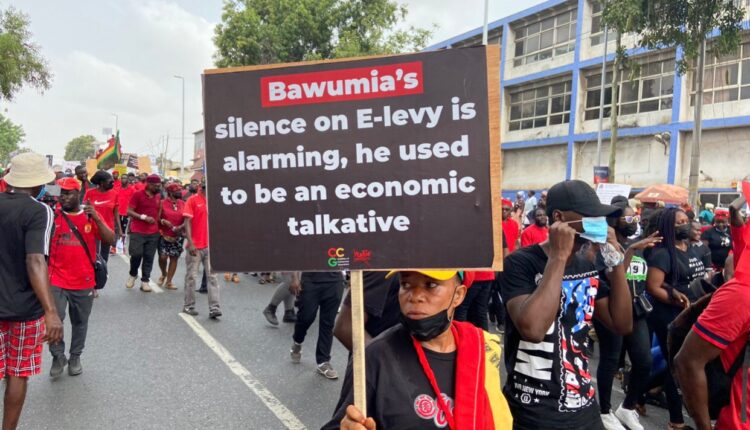Deputy Minister of Finance, John Kumah, has stated that the government cannot be held in contempt of court after implementing the Electronic Transfer Levy on Sunday, 1 May 2022.
Even though some legislators have challenged the new levy in court, Mr Kumah indicated that the court had not served the government with any order to halt the process.
Due to that, he holds the view that there was nothing that barred the government from proceeding with the implementation.
“There is no court order, so we have not breached anything. The fact that you have filed a motion in court does not mean you have an order of the court,” he justified in an interaction with journalists in the Ashanti Region.
Meanwhile, he has also assured that the government will address all challenges raised by users after the implementation kicked off.
Some users raised concerns that they were charged for making transfers below GHC 100, while others believed they had been levied beyond 1.5%.
Some social media users noted that transfers on the same or different networks or banks owned by the same user are also attracting the tax although they are meant to be exempted.
Responding to the issues, Mr Kumah said: “I’ve heard about some challenges [with the E-levy] and with every digital product that you introduce, there are bound to be challenges, but the important thing is that as a government we have built a robust system with all the stakeholders and all the challenges that are being talked about will be addressed in due course.
“I have heard about a few people complain about some of the exemptions that were supposed to apply but are not applying. These are the things that will be worked on. But generally, it [E-levy] is working,” he added.
If everything goes to plan, the government expects to generate GH¢4.5 billion from the tax in line with developments following the proposal tabled in November 2021.
In the 2022 Budget statement, the government said it aimed to collect GH¢6.9 billion from the levy from an initial tax rate of 1.75%.
However, after it was reviewed and slashed to 1.5%, the expectations have also been adjusted downwards.
Injunction and opposition
Not all Ghanaians are enthused about the levy, with the #FixTheCountry Movement threatening to sue the GRA if it proceeded with introducing the tax.
In a statement, the social media activist group reiterated that any attempt by the authority to enforce the new levy on May 1 would amount to contempt of court due to an injunction filed by some MPs.
The injunction filed on Tuesday, 19 April 2022, by three NDC legislators against the levy is still pending at the Supreme Court.

In their application, Minority Leader Haruna Iddrisu, Bawku Central MP Mahama Ayariga and North Tongu MP Samuel Okudzeto Ablakwa urged the apex court to restrain the Ghana Revenue Authority (GRA) from implementing the new tax.
They argued that millions of people would suffer irreparable harm if the E-Levy Act was not put on hold, and the court determined that its passage was unconstitutional.
According to them, the GRA would be unable to reimburse the millions who would have paid the E-levy, while the 1992 Constitution, which is the supreme law of the land, would have been undermined.
“That the Plaintiffs having raised an allegation of a breach of the Constitution in the passage of the Electronic Transfer Levy Act, 2022(Act 1075), in order to avoid an incalculable damage, injury and inconvenience not only to the people of Ghana but as well as undermining the Constitution which is the supreme law of the land, the justice of the case demands that the implementation of the Electronic Transfer Levy Act, 2022(Act 1075) is put on hold until the final determination of the instant suit,” the injunction application stated.
In their substantive suit, the three MPs expressed their desire for the apex court to declare the passage of the E-Levy as unconstitutional and, therefore, null and void.
It is their case that Parliament did not have the right quorum to pass the E-Levy as stipulated under Article 104(1) of the 1992 Constitution, which the Supreme Court had recently interpreted.
According to them, at the time the second reading for the passage of the E-Levy was done, there were only 136 MPs present in Parliament instead of the required 138.
Therefore, they want the court to declare the whole proceedings, including the second reading, third reading, and voting to pass the E-Levy, as unconstitutional and of no effect.
They had filed an earlier application against the E-Levy on 30 March 2022.

The General Secretary of the NDC, Johnson Aseidu Nketia, explained the importance of tax to national development and described the E-levy as counterproductive.
“If in the unlikely event, the E-levy is passed, we will abolish it in our next government because we do not see it as a tax. It is daylight robbery,” he stressed. “That is not to say that we will not be taking other taxes, but we are saying that this is not a tax based on any value addition or production; it is thievery, it is daylight robbery”.
However, on Tuesday, March 29, Parliament approved the policy without the participation of NDC MPs who had staged a walkout during the E-levy debate.
What is the E-levy?
The E-levy is a tax applied on transactions made on electronic or digital platforms. The Minister of Finance announced in Parliament the intention to implement the bill during the presentation of the 2022 Budget.
The tax is one of the measures government plans to use to increase the country’s tax to GDP ratio from 12 5% in 2021 to 20% by 2024.
The government said it would use the revenue for entrepreneurship, youth employment, digital infrastructure and cyber security, and provision of road infrastructure.
The E Levy is charged at the rate of 1 50% on the following transactions:
•Mobile Money transfers done between accounts on the same electronic money issuer
•Mobile Money transfers from an account on one electronic money issuer to a recipient on another electronic money issuer
•Transfers from bank accounts to mobile money accounts
•Transfers from mobile money accounts to bank accounts
•Bank transfers on an instant pay digital platform or application originating from a bank account belonging to an individual subject to a threshold to be determined by the Minister of Finance.
However, not all transfers will be affected by the E Levy.
The Levy does not apply to the following types of transfers:
• A cumulative transfer of One Hundred Ghana Cedis a day made by the same person
•A transfer between accounts owned by the same person
•A transfer for payment of taxes, fees and charges on the Ghana.Gov System or any other Government of Ghana designated payment system
•Specified merchant payments
•Transfers between principal, agent and master agent accounts and
•Electronic clearing of cheques
The Charging Entities are:
- Electronic Money Issuers
- Payment Service Providers
- Banks
- Specialised Deposit-Taking Institutions
- Other Financial Institutions prescribed by Regulations made under the Act.
The levy had divided Parliament, with the Majority pushing for approval while the Minority kicked against it.
There was a split vote of 12 for each side at parliament’s finance committee until the chairman cast the decisive vote favouring the proposal.
Parliament degenerated into fisticuffs at a meeting to approve the levy prompting an adjournment to 18 January 2022.
The Chamber turned chaotic as MPs pushed, shoved and punched each other during the heated exchanges that many observers have since condemned.
This was after the Speaker of Parliament, Alban Bagbin, had left and delegated the First Deputy Speaker, Joe Osei Owusu, to take over proceedings.
The Minority had said it would do all it could to ensure that the bill did not see the light of day, insisting it was not in the best interest of Ghanaians.



